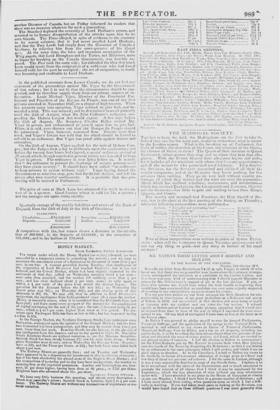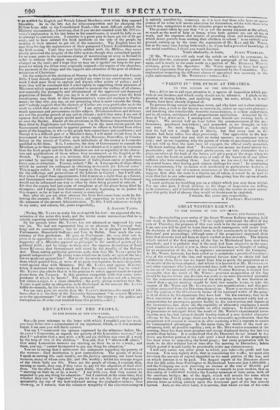3IR. YATES'S TIIIRD LETTER Al3OUT HIMSELF AND IRELAND.
TO THE EDITOR OF THE SPECTATOR.
Tioirles, 13th October le t6, Sr it—In my letter from Borrisnhane I slid ..ta argil, I hope, to satisfy all who know tine, that there WAR no ground for your insinuations th it primary arrange- inenta accompanied my invitation as a candidate to the County Carlow, and thit there was some hind of understanding that I should support Alinisters in rein a for Mr. O'CONNELL's support of me at the last election. If you, nr those who censure me, would have taken the least trouble in inquiring, they would have been convinced that no candidate was ever more utijustly suspected of resortiug, to any extraordinary means to insure his return.
You say you have picked me out from amongst the Irish Members for ani- madversion, in consequence of my great professions as a Reformer and purist at Bolton, in 1S:32, and my conduct at that election and since being so much at variance with my conduct and my votes the laid session. I refused equally at Bolton and at Carlow to make pledges, excepting that I would give art account from time to time of the way in which I executed the trust com- mitted to me. Of any kind of corruptiou I have been as free at the latter as at the farmer place.
At Bolton I was pressed to pledge myself to vote for Annual Parliaments, Universal Suffrage, and the application of the sponge to the National Debt. I declined it, and adhered to my views in favour of Triennid Parliaments, Household Suffrage, Vote by Ballot, and a tax on all property, including the public funds, it) order to selieve the industrious classes front the pressure of tax- ation, and diminish the mit-s of crime, perjury, and fraud, which are created by our present system of taxation. I lost the election in Bolton in conaequence; for the Ultra-Radicals put up Mr. EAGLE to receive their votes, thus playing into tine hands of the Tories by disuniting the Reformers; so that I was beaten by an adherence to the same principles which I still profess, and which I see no good reason to abandon. As to the Corn-laws, I stated at Bolton my views to be decidedly in favour of a constant admission of fweign grain at a fixed and low duty of about ten per cent, ad rtdorem. I did the same at Carlow, although it was a very unpalatable doctrine to some of my friends there. I believe it to be in accordance with the views of the Government, and co much calculated to promote the interest of all classes, that I think it may be sanctioned by the Legislature, which the free admission of corn without any duty whatsoever never will. I have attended in my place in the House of Commons as closely as any one Member ; I think I have been in a greater number of divisions ; and I have never shrunk from voting, when questions arose on which I bad a diffi- culty in deciding. If you had taken more pains in looking at the division', you would have found that on those difficult questions I was more generally with han againet the English and .'re.teatch Liberal Member, even when they opposed Itlinisters. As to the late Act for tithe-composition and for charging the Alillion Loan debt to the Consolidated Fund,—the most difficult subject the Alinistry encountered,—I must say, that if you are not satisfied with Mr. O'Ccos- le ELL'S explanation in his last letter to his constituents, it would be folly in me to attempt to convince you. I consider it a great gain to have got rid of 25 per cent., and to have inlisted the Irish landlords on the side of the people, by making it their interest to get rid of the remainder. The Englieh have for ages been foreing the maintenance of their pampered Church Establishment on th 1rih tuition. Until they were fairly saddled with the Million, they never clearly perceived the iniquity of the tithe system, though they submitted quietly for so many years to the enormous charge of maintaining an army in Ireland in order to enforce this unjust impost. About 400,000/. per annum remains charged on the land; and I hope that we may see it applied ere long to the pur- poses for which the tithes were originally imposed—the repairs of the churches, the payment of the clergy, and the support and education of the poor of all dello- rninations of Christians.
On the subjects of the abolition of Slavery in the Colonies and on the Canada Bills. I have already explained and justified ray votes to my constituents ; next week I shall meet them to explain and discuss other points of policy ; and I trust they will be convinced that I acted rightly in supporting those measures of Ministers which appeared to me calculated to promote the welfare of all classes, and especially the prosperity and advancement of the oppressed and depressed population of Ireland. But you say it is of little consequence what the Irish constituency may think of their Representative's votes and conduct in Parlia- ment; for they rely, you say, on our procuring what is most valuable for them, and "nobody suspects that the electors of Carlow are very particular as to the mode in which that share is obtained." I am sorry you continue to evince so much ignorance and perverseness on this subject. Disinterestedness and delicacy are not the peculiar growth of any soil or climate ; and if they were, I am not of opinion that the Irish people would send for a supply either across the Channel or over the Border. Almost all the situations in the Revenue departments have been tilled by Englishmen and Scotchmen. Up to the most recent period, the Government have continued to appoint persons to offices in Ireland from other parts of the kingdom, in whom the people here cannot have just confidence ; and though it is a difficult part of a Member's duty, I will never shrink from it, to recommend to the vacancies that arise in the Revenue, Post.office, or Consta- bulary in the county of Carlow, such individuals of the county as I consider qualified to fill them. It is, I conceive, the duty of Government to consult the Members as to these appointments ; and it is as absurd as it is unfair to insinuate that the Irish people and the Irish Members are not as regardful of the charac• ters and qualifications of those whom they recommend, as the English or the Scotch. To suppose, as you intimate, that my independence is at all com- promised by assisting in the appointment of half-a•dozen excise or policemen every year, is ridiculous. You say, indeed, "Mr. A. Yates speaks of those offices which he assisted his colleagues in obtaining as rewards for Liberal votes." This is again unfair. I did say, and I repeat it, they were a pour compensation for the sufferings and persecutions of the Liberals in Carlow : but I will add, that when I urged those appointments, I did it more as a right than as a favour, and Government were assured that my support of their measures in Parliament would not be influenced one way or other by their being granted or refueed. I felt that the county hail just cause of complaint at all the places being filled by stiangers; and I repeat, that Government are only begiuning to do justice in this respect, as far at least as that county is concerned.
But, after all, you ask what advance the Irish Reformers have made by fol- lowing the counsels of Mr. O'CoeNEI.I., and supperting so much as they do the measures of the present Administration. To this I will endeavour to reply in my next; and remain, Sir, yours respectfully,
J. ASHTON YATES.
[We beg Mr. YATES to make his next epistle his last : we expected the ter. mination of the series this week, and the writer seems unconscious that he is already repeating matters before exhausted. By his present letter Mr. YATES not advanced or improved his case one jot. We had not represented him as an advocate for 'Universal Suf- frage and its concomitants; but he adinite that he is pledged to Triennial Farliamente, Household Suffrage, and Vote by Ballot. Now mai k the con- sistency of this gentleman. He goes to Parliament : the very first vote he pives is in opposition to an extension of the sidliage ; he becomes the stanch supporter of a Ministry opposed On principle to the cardinal points of his political iitith ; and be clings to them after the express declaration of Laid JOHN RUSSELL that Government will stand by the .einolity of the Reform Act. Then, setting particular questions iside, how does Mr. Veers prove hie general independence? By citing votes which eau be fairly set ageing the long list we made out against him ? Not at all : he merely says, in effect, that on ques- tions which puzzled him, or were of no party consequence, be more frequently voted against than with Ministers. Did Mr. YATES ever oppose Minietets when it mattered two straws to Lord Jolts: RUSSELL which way he voted ? Mr. YATES also admits that it is his practice to solicit appoinernente to vacant places from the Treasury. Is this practice compatible with that entire inde- pendence of which he boasts ? The pretence that he does not ask a favour, but claims a right, is a sheer absurdity : the perry giving considers flea Mr. YATES is put under an obligation, to be discharged in the inannee Mr. Yeeres fulfils it—namely, by his vote when it is wanted.
For our own part, we utterly deny Mr. YAT Es's doctrine—the creed of job- bers—that it is the duty of the Executive Government " to coneult Members as to the appointinente" of its officers. Nothing hut injury to the public and corruption on all sides ever resulted from this practice.—Eo.1



























 Previous page
Previous page